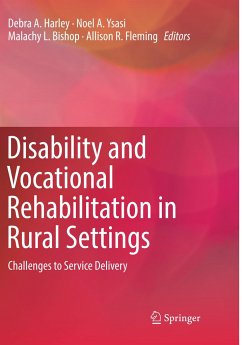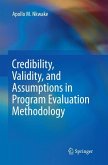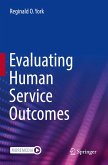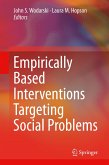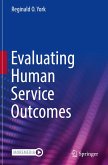Disability and Vocational Rehabilitation in Rural Settings
Challenges to Service Delivery
Herausgegeben:Harley, Debra A.; Ysasi, Noel A.; Bishop, Malachy L.; Fleming, Allison R.
Disability and Vocational Rehabilitation in Rural Settings
Challenges to Service Delivery
Herausgegeben:Harley, Debra A.; Ysasi, Noel A.; Bishop, Malachy L.; Fleming, Allison R.
- Broschiertes Buch
- Merkliste
- Auf die Merkliste
- Bewerten Bewerten
- Teilen
- Produkt teilen
- Produkterinnerung
- Produkterinnerung
This first-of-its-kind textbook surveys rehabilitation and vocational programs aiding persons with disabilities in remote and developing areas in the U.S. and abroad. Contributors discuss longstanding challenges to these communities, most notably economic and environmental obstacles and ongoing barriers to service delivery, as well as their resilience and strengths. Intersections of health, social, structural, and access disparities are shown affecting rural disabled populations such as women, racial and sexual minorities, youth, and elders. In terms of responses, a comprehensive array of…mehr
Andere Kunden interessierten sich auch für
![Credibility, Validity, and Assumptions in Program Evaluation Methodology Credibility, Validity, and Assumptions in Program Evaluation Methodology]() Apollo M. NkwakeCredibility, Validity, and Assumptions in Program Evaluation Methodology39,99 €
Apollo M. NkwakeCredibility, Validity, and Assumptions in Program Evaluation Methodology39,99 €![The Coronavirus Crisis and Challenges to Social Development The Coronavirus Crisis and Challenges to Social Development]() The Coronavirus Crisis and Challenges to Social Development93,99 €
The Coronavirus Crisis and Challenges to Social Development93,99 €![Evaluating Human Service Outcomes Evaluating Human Service Outcomes]() Reginald O. YorkEvaluating Human Service Outcomes39,99 €
Reginald O. YorkEvaluating Human Service Outcomes39,99 €![The Coronavirus Crisis and Challenges to Social Development The Coronavirus Crisis and Challenges to Social Development]() The Coronavirus Crisis and Challenges to Social Development131,99 €
The Coronavirus Crisis and Challenges to Social Development131,99 €![Empirically Based Interventions Targeting Social Problems Empirically Based Interventions Targeting Social Problems]() Empirically Based Interventions Targeting Social Problems58,99 €
Empirically Based Interventions Targeting Social Problems58,99 €![Religion, Disability, and Interpersonal Violence Religion, Disability, and Interpersonal Violence]() Religion, Disability, and Interpersonal Violence54,99 €
Religion, Disability, and Interpersonal Violence54,99 €![Evaluating Human Service Outcomes Evaluating Human Service Outcomes]() Reginald O. YorkEvaluating Human Service Outcomes53,49 €
Reginald O. YorkEvaluating Human Service Outcomes53,49 €-
-
-
This first-of-its-kind textbook surveys rehabilitation and vocational programs aiding persons with disabilities in remote and developing areas in the U.S. and abroad. Contributors discuss longstanding challenges to these communities, most notably economic and environmental obstacles and ongoing barriers to service delivery, as well as their resilience and strengths. Intersections of health, social, structural, and access disparities are shown affecting rural disabled populations such as women, racial and sexual minorities, youth, and elders. In terms of responses, a comprehensive array of healthcare and health policy solutions and recommendations is critiqued with regard to health, employment, and service effectiveness outcomes.
Included among the topics:
Healthcare initiatives, strategies, and challenges for people with disabilities in rural, frontier, and territory settings.
Challenges faced by veterans residing in rural communities.
The Asia and Pacific region: rural-urban impact on disability.
Challenges after natural disaster for rural residents with disabilities.
Meeting the needs of rural adults with mental illness and dual diagnoses.
Capacity building in rural communities through community-based collaborative partnerships.
Disability and Vocational Rehabilitation in Rural Settings makes a worthy textbook for graduate students and upper-level undergraduates in the fields of social work, community and environmental psychology, public health, sociology, education, and geography. Its professional audience also includes vocational rehabilitation counselors serving these dynamic populations.
Included among the topics:
Healthcare initiatives, strategies, and challenges for people with disabilities in rural, frontier, and territory settings.
Challenges faced by veterans residing in rural communities.
The Asia and Pacific region: rural-urban impact on disability.
Challenges after natural disaster for rural residents with disabilities.
Meeting the needs of rural adults with mental illness and dual diagnoses.
Capacity building in rural communities through community-based collaborative partnerships.
Disability and Vocational Rehabilitation in Rural Settings makes a worthy textbook for graduate students and upper-level undergraduates in the fields of social work, community and environmental psychology, public health, sociology, education, and geography. Its professional audience also includes vocational rehabilitation counselors serving these dynamic populations.
Produktdetails
- Produktdetails
- Verlag: Springer / Springer International Publishing / Springer, Berlin
- Artikelnr. des Verlages: 978-3-319-87873-7
- Softcover reprint of the original 1st ed. 2018
- Seitenzahl: 764
- Erscheinungstermin: 24. August 2018
- Englisch
- Abmessung: 254mm x 178mm x 39mm
- Gewicht: 1582g
- ISBN-13: 9783319878737
- ISBN-10: 3319878735
- Artikelnr.: 55129653
- Herstellerkennzeichnung Die Herstellerinformationen sind derzeit nicht verfügbar.
- Verlag: Springer / Springer International Publishing / Springer, Berlin
- Artikelnr. des Verlages: 978-3-319-87873-7
- Softcover reprint of the original 1st ed. 2018
- Seitenzahl: 764
- Erscheinungstermin: 24. August 2018
- Englisch
- Abmessung: 254mm x 178mm x 39mm
- Gewicht: 1582g
- ISBN-13: 9783319878737
- ISBN-10: 3319878735
- Artikelnr.: 55129653
- Herstellerkennzeichnung Die Herstellerinformationen sind derzeit nicht verfügbar.
Debra A. Harley, Ph.D., CRC, LPC is a Professor in the Clinical Rehabilitation Counseling Mental Health program and co-coordinator of the Rehabilitation Counseling Education, Research, and Policy Doctoral Program at the University of Kentucky. She received her Ph.D. from Southern Illinois University at Carbondale. Dr. Harley has over twenty-three years of experience in teaching and research. Dr. Harley holds the distinction of Provost's Distinguished Service Professor. She has published over 85 journal articles and 47 book chapters. Dr. Harley is past editor of the Journal of Applied Rehabilitation Counseling and the Journal of Rehabilitation Administration and guest editor of numerous special issues of rehabilitation journals. She is co-editor of several books, Contemporary Mental Health Issues Among African Americans and the Handbook of LGBT Elders: An Interdisciplinary Approach to Principles, Practices, and Policies . Dr. Harley is a facultyaffiliate with the Department of Gender and Women's Studies, the Center on Research on Violence Against Women, and the Human Development Institute at the University of Kentucky. She is recipient of the 2006 National Council on Rehabilitation Education Educator of the Year Award and a National Rehabilitation Association Switzer Scholar. Noel A. Ysasi, Ph.D., CRC, is an Assistant Professor in the Clinical Rehabilitation Counseling Mental Health program at the University of Kentucky. He acquired his Ph.D. from the University of Texas Pan-American. Dr. Ysasi's professional work experience involves over seven years of teaching in higher education; forensic rehabilitation; working with the veteran population. His research interests include the veteran population, people with spinal cord injuries, forensic rehabilitation, and perceptions of individuals with disabilities. Dr. Ysasi has been the recipient of multiple awards, including a LifetimeAchievement Award by the U.S. Veterans Affairs, and the 2015 national doctoral student awards by the national Council on Rehabilitation Education and the American Rehabilitation Counseling Association. Malachy L. Bishop,Ph.D., CRC, is a Professor in the Clinical Rehabilitation Counseling Mental Health program at the University of Kentucky. He received his Ph.D. from the University of Wisconsin-Madison. Dr. Bishop is the coordinator of the Rehabilitation Counseling Education, Research, and Policy Doctoral Program. He also serves as Director of Development and Research for the University of Kentucky's University Center for excellence in Developmental Disabilities in the Human Development Institute. Dr. Bishop's clinical background includes rehabilitation counseling, rehabilitation psychology and neuropsychology in physical medicine and rehabilitation and other health care settings, and vocational assessment. Dr. Bishop has authored over100 journal article and book chapters and two books in health care and rehabilitation counseling. He conducts research psychosocial and employment-related aspects of chronic neurological conditions, including epilepsy, multiple sclerosis, and brain injury; quality of life and adaptation to disability; self-management; and developmental disabilities. Dr. Bishop is a five-time recipient of the American Rehabilitation Counseling Association's Research Award, and the 2015 recipient of the National Council on Rehabilitation Education Researcher of the Year Award. Allison R. Fleming, Ph.D., CRC, is an Assistant Professor in the Human and Rehabilitation Services program at Pennsylvania State University. She received her Ph.D. from Michigan State University. Dr. Fleming's professional experience includes work as a vocational rehabilitation counselor, a staff trainer for RCEP, and faculty in rehabilitation counseling at the University of Kentucky. Her researchinterests include the application of the International Classification of Functioning to the conceptualization of quality of life among individuals with disability, professional identity in rehabilitation counseling, and post-secondary and employment outcomes for young adults with disabilities.
Entrepreneurship and Economic Development in Rural America.- Disability, Income, and Rural Poverty.- Transportation, Accessibility and Accommodation in Rural Communities.- The Role of Technology in Service Delivery for People With Disabilities in Rural Communities.- Healthcare Initiatives, Strategies, and Challenges for People with Disabilities in Rural, Frontier and Territory Settings.- Ethical Vocational Rehabilitation Practice and Dual Relationships in Rural Settings.- Resilience and Strengths of Rural Communities.- Challenges Faced by Veterans Residing in Rural Communities.- Marginalized Racial and Ethnic Adults with Disabilities in Rural Communities: The Role of Cultural Competence and Social Justice.- Adolescents and Transition Students with Disabilities in Rural Areas.- Women, Older Adult, and LGBTQ Populations with Disabilities in Rural, Frontier, and Territory Communities.- Offender Populations with Disabilities in Rural Settings.- American Indians and Alaska Natives with Disabilities in Rural, Tribal Lands, Frontier Regions, and Plain States.- Agricultural, Farm, and Immigrant Workers with Disabilities.- Sensory Impairments Among Rural Populations in America.- Rehabilitation Practice, Employment, and Policy for Rural Development for People with Disabilities in West Africa.- The Asia and Pacific Region: Rural-Urban Impact on Disability.- Disability and Vocational Rehabilitation in Rural and Remote Australasia.- Rural Development, Employment, Chronic Health, and Economic Conditions in Canada.- People with Disabilities and Mental Health Disorders in Mexico: Rights and Practices.- System of Service Delivery for People with Disabilities in India and Impact in Rural Areas.- Rehabilitation Practices, Employment, and Policy for Rural Development for People with Disabilities in Turkey.- Rehabilitation Services in Colombia.- Disability Policies and Practices in the Rural United Kingdom.- Challenges After Natural Disaster for Rural Residents with Disabilities.- Meeting the Needs of Rural Adults with Mental Illness and Dual Diagnoses.- Multiple Sclerosis Among Rural Residents: Treatment, Psychosocial Implications, and Vocational Implications.- Substance-Related and Addictive Disorders Treatment in Rural, Frontier, and Territory Settings.- Marketing Vocational Rehabilitation Services in Rural Communities.- Implications of Workforce Innovation and Opportunity Act (WIOA) in Rural, Frontier, and Territory Communities.- Americans with Disabilities Act in Rural America: A Case Study.- Rural Forensic Vocational Rehabilitation Practice: Challenges and Opportunities for Rehabilitation Professionals.- Climate and Weather in the United States and Its Impact on People with Disabilities in Rural Communities.- Developing the Personnel to Meet the Needs of Persons with Disabilities in Rural Settings Through Online Learning.- Human Resources Issues: Recruiting and Retaining Rehabilitation Counselors and Human Service Professionals in Rural, Frontier, and TerritoryCommunities.- Capacity Building in Rural Communities Through Community Based Collaborative Partnerships.- Utilizing Indigenous Volunteers and Paraprofessionals for Disability Advocacy and Service in Rural America.- Research and Evidence-Based Practices of Vocational Rehabilitation in Rural, Frontier, and Territory Communities.
Entrepreneurship and Economic Development in Rural America.- Disability, Income, and Rural Poverty.- Transportation, Accessibility and Accommodation in Rural Communities.- The Role of Technology in Service Delivery for People With Disabilities in Rural Communities.- Healthcare Initiatives, Strategies, and Challenges for People with Disabilities in Rural, Frontier and Territory Settings.- Ethical Vocational Rehabilitation Practice and Dual Relationships in Rural Settings.- Resilience and Strengths of Rural Communities.- Challenges Faced by Veterans Residing in Rural Communities.- Marginalized Racial and Ethnic Adults with Disabilities in Rural Communities: The Role of Cultural Competence and Social Justice.- Adolescents and Transition Students with Disabilities in Rural Areas.- Women, Older Adult, and LGBTQ Populations with Disabilities in Rural, Frontier, and Territory Communities.- Offender Populations with Disabilities in Rural Settings.- American Indians and Alaska Natives with Disabilities in Rural, Tribal Lands, Frontier Regions, and Plain States.- Agricultural, Farm, and Immigrant Workers with Disabilities.- Sensory Impairments Among Rural Populations in America.- Rehabilitation Practice, Employment, and Policy for Rural Development for People with Disabilities in West Africa.- The Asia and Pacific Region: Rural-Urban Impact on Disability.- Disability and Vocational Rehabilitation in Rural and Remote Australasia.- Rural Development, Employment, Chronic Health, and Economic Conditions in Canada.- People with Disabilities and Mental Health Disorders in Mexico: Rights and Practices.- System of Service Delivery for People with Disabilities in India and Impact in Rural Areas.- Rehabilitation Practices, Employment, and Policy for Rural Development for People with Disabilities in Turkey.- Rehabilitation Services in Colombia.- Disability Policies and Practices in the Rural United Kingdom.- Challenges After Natural Disaster for Rural Residents with Disabilities.- Meeting the Needs of Rural Adults with Mental Illness and Dual Diagnoses.- Multiple Sclerosis Among Rural Residents: Treatment, Psychosocial Implications, and Vocational Implications.- Substance-Related and Addictive Disorders Treatment in Rural, Frontier, and Territory Settings.- Marketing Vocational Rehabilitation Services in Rural Communities.- Implications of Workforce Innovation and Opportunity Act (WIOA) in Rural, Frontier, and Territory Communities.- Americans with Disabilities Act in Rural America: A Case Study.- Rural Forensic Vocational Rehabilitation Practice: Challenges and Opportunities for Rehabilitation Professionals.- Climate and Weather in the United States and Its Impact on People with Disabilities in Rural Communities.- Developing the Personnel to Meet the Needs of Persons with Disabilities in Rural Settings Through Online Learning.- Human Resources Issues: Recruiting and Retaining Rehabilitation Counselors and Human Service Professionals in Rural, Frontier, and TerritoryCommunities.- Capacity Building in Rural Communities Through Community Based Collaborative Partnerships.- Utilizing Indigenous Volunteers and Paraprofessionals for Disability Advocacy and Service in Rural America.- Research and Evidence-Based Practices of Vocational Rehabilitation in Rural, Frontier, and Territory Communities.

